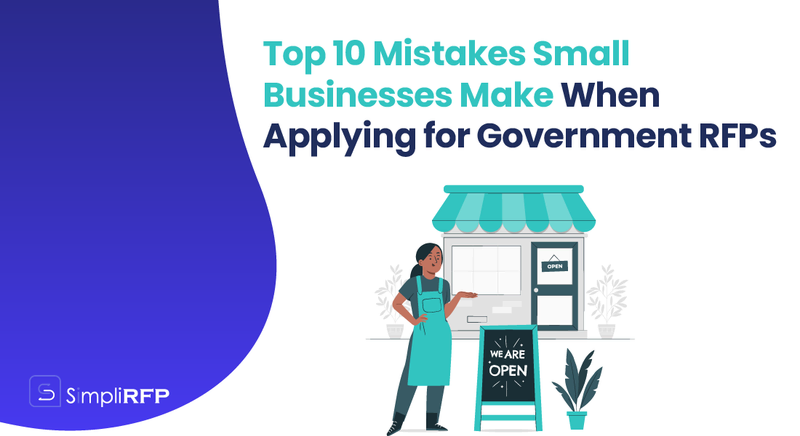Top 10 Mistakes Small Businesses Make When Applying for Government RFPs
Embarking on the journey to secure government contracts can be a game-changer for small businesses, opening doors to lucrative opportunities. However, the path is fraught with challenges, and small enterprises often find themselves making critical mistakes in the process. In this exploration of the top 10 mistakes small businesses make when applying for Government Requests for Proposals (RFPs), we dissect common pitfalls, shed light on avoidable errors, and provide insights into improving the chances of success in the competitive world of government contract bidding.
Common Blunders in Small Business Government RFP Submissions
Navigating the intricate landscape of government RFPs can be daunting for small businesses, particularly when they inadvertently make critical mistakes that impact their chances of success. In this exploration of the top 10 mistakes small businesses commonly make when applying for Government Requests for Proposals (RFPs), we dissect the common pitfalls, shed light on avoidable errors, and provide insights into improving the chances of success in the competitive world of government contract bidding.
Common Pitfalls in Small Business Government RFP Submissions
Small businesses, eager to secure government contracts, often find themselves navigating a challenging landscape fraught with potential pitfalls. Understanding these common mistakes is crucial for avoiding missteps and ensuring a more successful approach to Government Requests for Proposals (RFPs). Here are the first two major mistakes that small businesses frequently make when applying for government RFPs:
- Insufficient Understanding of RFP Requirements
One of the primary missteps small businesses make is a failure to thoroughly comprehend the intricacies of the RFP. Whether due to oversight or a rushed review, inadequately understanding the specific requirements outlined in the RFP can lead to proposals that miss the mark. This lack of clarity can result in non-compliance and a failure to address key elements crucial to the government’s needs.
- Lack of Alignment with Evaluation Criteria
Another common pitfall is a failure to align with the evaluation criteria set forth in the RFP. Small businesses may overlook the importance of tailoring their proposals to directly address the criteria by which their submissions will be judged. This misstep can significantly diminish the effectiveness of the proposal, as it may not effectively showcase how the business meets the government’s key evaluation metrics.
- Inadequate Research on Government Agency
A prevalent mistake is the lack of thorough research on the government agency issuing the RFP. Small businesses may overlook the importance of understanding the agency’s mission, goals, and specific needs. Without this foundational knowledge, crafting a proposal that resonates with the agency’s objectives becomes challenging, leading to missed opportunities to align the business with the government’s mission.
- Poorly Defined Unique Value Proposition (UVP
Small businesses often falter in clearly articulating their Unique Value Proposition (UVP) in their proposals. Failing to highlight what sets their business apart from competitors can result in a generic and undifferentiated submission. Government evaluators need to see the distinct value a small business brings, and a poorly defined UVP can undermine the overall impact of the proposal.
- Inadequate Collaboration and Communication Within the Team
Effective collaboration is a cornerstone of successful RFP submissions, yet small businesses sometimes neglect internal communication. Miscommunication and a lack of collaboration among team members can result in disjointed proposals. To avoid this pitfall, small businesses should establish clear lines of communication, assign responsibilities, and ensure that team members are aligned in their understanding of the RFP requirements.
- Overlooking Compliance Regulations
Government contracts often come with stringent compliance regulations, and overlooking these can be a critical error. Small businesses may inadvertently neglect to adhere to specific compliance standards, jeopardizing their eligibility for the contract. Thoroughly reviewing and understanding the compliance requirements outlined in the RFP is essential to ensure that the proposal meets all necessary regulations.
- Lack of Emphasis on Past Performance and Relevant Experience
Failing to adequately showcase past performance and relevant experience is a common mistake that can hinder small businesses in government RFP submissions. Government agencies seek assurances that a business has a proven track record of success. If a proposal lacks compelling evidence of past achievements and relevant experience, it may not instill the confidence needed for successful contract awards.
- Inadequate Proposal Management and Planning
Small businesses might underestimate the importance of robust proposal management and planning processes. Insufficiently allocating time and resources to organize, review, and refine the proposal can result in a hastily compiled submission that lacks the necessary polish. Effective proposal management involves setting clear timelines, designating responsibilities, and implementing quality control measures to ensure a well-crafted and error-free proposal.
- Neglecting to Address Potential Risks and Mitigation Strategies
Small businesses may overlook the importance of addressing potential risks in their proposals. Government agencies are keenly interested in understanding how a business identifies and mitigates risks associated with the proposed project. Failure to anticipate and provide clear mitigation strategies can raise concerns about the small business’s ability to navigate challenges, potentially diminishing the proposal’s overall competitiveness.
- Ignoring Feedback and Continuous Improvement
A crucial mistake is ignoring feedback from previous RFP submissions and failing to implement continuous improvement measures. Small businesses should view each submission as an opportunity to learn and refine their approach. Disregarding feedback, whether from previous unsuccessful bids or industry trends, can perpetuate the repetition of mistakes and hinder the business’s evolution in the competitive government contracting landscape.
Avoidable Errors and Challenges in Government Contract Bidding for Small Enterprises

In the competitive landscape of government contract bidding, small enterprises often face avoidable challenges that, with strategic attention, can be effectively mitigated.
Compliance Clarity
Understanding and adhering to compliance regulations is critical. Small enterprises must thoroughly comprehend the standards outlined in the RFP to ensure eligibility and build credibility with government agencies.
Holistic Risk Management
Small businesses sometimes fall short in addressing potential project risks comprehensively. Agencies seek proposals with well-defined mitigation strategies, emphasizing the importance of a holistic approach to risk management for building confidence with evaluators.
Continuous Improvement Integration
Neglecting to incorporate feedback into future proposals is a missed opportunity for improvement. Small enterprises should view feedback as a roadmap for enhancing competitiveness, ensuring each bid reflects lessons learned and aligns more closely with government expectations.
Typical Mistakes in Government RFP Applications
Misinterpreting RFP requirements, neglecting compliance, and submitting poorly structured proposals are common. Understanding these errors is crucial for improvement.
Improving Chances in Government Contract Bidding
Thoroughly understand RFP requirements, tailor proposals to agency needs, showcase past successes, collaborate effectively, and stay informed about industry trends.
Specific Overlooked Regulations in RFP Submissions
Small businesses often overlook compliance, reporting standards, and diversity requirements. Thoroughly review RFP documentation to ensure adherence.
Rectifying Errors in Government RFP Applications
Proactively learn from feedback, implement corrective measures, seek guidance, and leverage tools like Simpli RFP for accurate and effective submissions.
Importance of Tailoring Proposals to Agency Requirements
Paramount for success, tailoring proposals demonstrates understanding and increases chances of standing out among competitors.
In the intricate landscape of government contract bidding, Simpli RFP stands as the ally for small enterprises. Our innovative software streamlines the complexities of proposal development, ensuring accuracy, adherence to regulations, and improved competitiveness. Elevate your government contract bidding with Simpli RFP and navigate the path to success with confidence.
